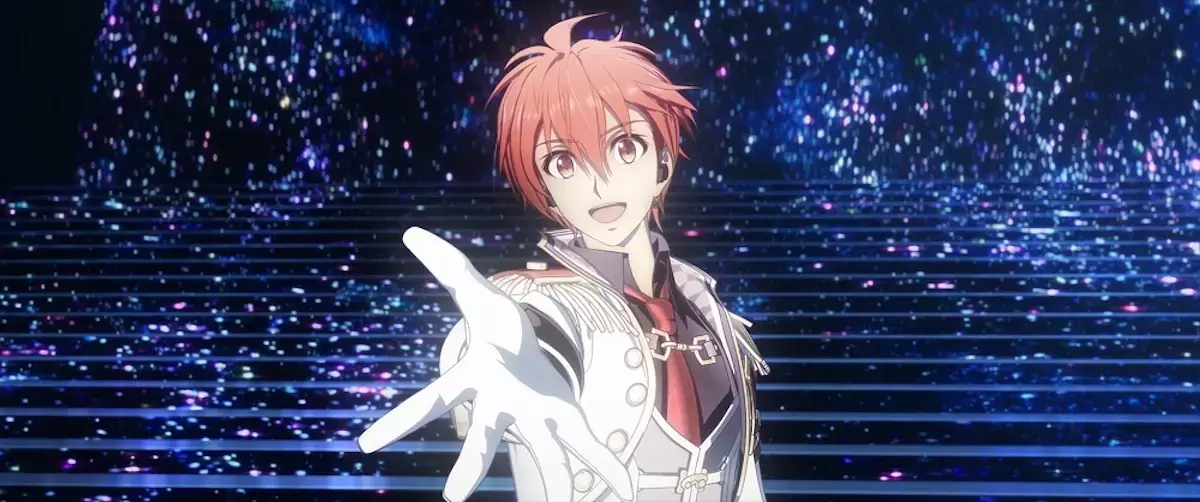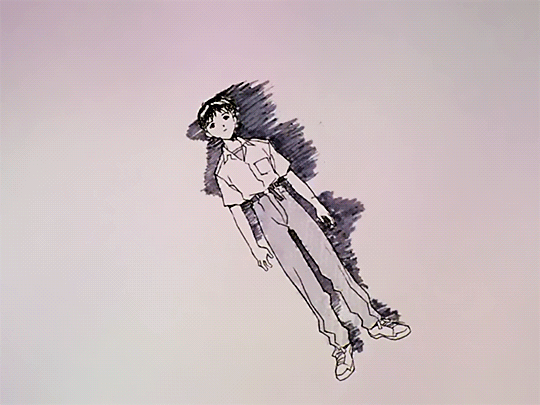I can't quite remember where, but I was reading an essay about Evangelion - maybe it was specifically about End of Evangelion, I wonder. It may have been in a Eureka volume. Anyway, I was reading it, and it made me think that I've never quite encountered the sort of Evangelion analysis that pleased me, because so many of them, like the one I was reading in that moment, fall back to the ultimate conclusion that Shinji has to accept that maturity and "growing up" are inevitable. That Evangelion is (at least in part) a critique of the socially inept otaku crowds, who refuse to give up their embarassing hobbies and integrate into society like a normal person. The director Anno Hideaki has spoken about the toxicity apparent in otaku subcultures, while being otaku himself. And I mean, that criticism is necessary AND it is very possible to read Evangelion along this "rejection of maturity" dynamic, as a sort of self-deprecating 'fuck you' move to the otaku audience. Considering how utterly depressing the ending is, it leaves us in a space in which the only option is to continue to live in a desolate and hostile space with no hopes for salvation. I put "growing up" and "maturity" in these readings in quotation marks, because all these readings ever describe is a supposed inevitability of getting your shit together and joining in in reproductive heteropatriarchy - the guy gets a job, contributes to the economy, fucks the girl who becomes a good wife, they make babies, and only ever engage with otaku materials from a place of shame.
Considering that Gainax was born out of an animated (lol) conversation at an otaku convention, I think the underlying position has to be that of a shared creative drive, an intensity in the level of engagement that is offputting so as to warrant the otaku label. And this is fun, and sustainable on a small scale, until maybe it gets too big, and too intense, and then maybe there's also self-hatred inolved, and with time the pressure to participate in reproductive heteropatriarchy rises, and it becomes unbearable, and THAT's where End of Evangelion leaves us.
I mean, Shinji is pathetic, and so depressed, but maybe the only point at which he didn't want to off himself was when he connected with Kaworu. And maybe the feelings in that moment overlap with those of the young Anno during those initial conversations that lead to the establishment of Gainax - that you can meet someone, and intensify eachother, and create, ultimately together. And that this can be enough.
Under reproductive heteropatriarchy, this can never be enough. And I don't want to impose anything on or assume anything about Anno, but I really think, that maybe Shinji would've have wanted to end it all if the option of a queer dynamic could've ever occured to him - because when queerness is present, the "growing up" and the "maturity" elements get twisted and reworked, and that's the point of it all. End of Evangelion says that you can create and hope but it will be futile - destruction follows. If you introduce queerness to the dynamic though, the destruction is carried out before the futility ever gets to set in. That destruction is a productive one, and it offsets the scale by queering antisociality. Then you end up in a place where otaku can be rethought radically.
I came to to think about this as I was listening to the song Pieces of the World from the Idolish7 Beyond the Period film from last year. The song is a sort of overview of the grandiosity of the universe itself (yes), and the smallness of the singular human against that backdrop. This is basically End of Evangelion, the same conundrum that was resolved in there by someone by trying to render every human into cosmic goo so our consciousness can break through its perceptual boundaries. Obviously, this doesn't come up in the idol song. Then, I suddenly asked myself: why is it that the idols get to sing of imagination (あらゆる屈託を / 壊して創造をしたい) in the face of futility (灰の下の文明 どんな歌があった / 声も夢も消えて 追想に), when all that's left for Shinji to do is stare at the terrible red of the skyline?
Maybe the queer position (=the position in which you can destroy, imagine and reorder) is available to Idolish7 because they are temporarily removed from reproductive heteropatriarchy through the status of "idols", as in, the idol is not even a human but a dream - and that reworking of the human is very similar to how queerness reworks the world on the whole. (I could also add something about the queernes at large within the Idolish7 franchise, but maybe this is not the place and time-)
Not sure what the conclusion is here. Maybe it's that Shinji should've taken up singing and dance. Maybe it's that indeed, I get annoyed reading analyses of Evangelion where I can see the author shaking his head like "maturity is inevitable and otaku have to accept it", because the adult life they refer to is never the same as mine, because it's reductive, and because I beg that they consider the existence of someone who is god forbid not a cis straight guy. But anyway. I think if Shinji was allowed to be queer, maybe the sky he looks up at the end would have been blue.
Considering that Gainax was born out of an animated (lol) conversation at an otaku convention, I think the underlying position has to be that of a shared creative drive, an intensity in the level of engagement that is offputting so as to warrant the otaku label. And this is fun, and sustainable on a small scale, until maybe it gets too big, and too intense, and then maybe there's also self-hatred inolved, and with time the pressure to participate in reproductive heteropatriarchy rises, and it becomes unbearable, and THAT's where End of Evangelion leaves us.
I mean, Shinji is pathetic, and so depressed, but maybe the only point at which he didn't want to off himself was when he connected with Kaworu. And maybe the feelings in that moment overlap with those of the young Anno during those initial conversations that lead to the establishment of Gainax - that you can meet someone, and intensify eachother, and create, ultimately together. And that this can be enough.
Under reproductive heteropatriarchy, this can never be enough. And I don't want to impose anything on or assume anything about Anno, but I really think, that maybe Shinji would've have wanted to end it all if the option of a queer dynamic could've ever occured to him - because when queerness is present, the "growing up" and the "maturity" elements get twisted and reworked, and that's the point of it all. End of Evangelion says that you can create and hope but it will be futile - destruction follows. If you introduce queerness to the dynamic though, the destruction is carried out before the futility ever gets to set in. That destruction is a productive one, and it offsets the scale by queering antisociality. Then you end up in a place where otaku can be rethought radically.
I came to to think about this as I was listening to the song Pieces of the World from the Idolish7 Beyond the Period film from last year. The song is a sort of overview of the grandiosity of the universe itself (yes), and the smallness of the singular human against that backdrop. This is basically End of Evangelion, the same conundrum that was resolved in there by someone by trying to render every human into cosmic goo so our consciousness can break through its perceptual boundaries. Obviously, this doesn't come up in the idol song. Then, I suddenly asked myself: why is it that the idols get to sing of imagination (あらゆる屈託を / 壊して創造をしたい) in the face of futility (灰の下の文明 どんな歌があった / 声も夢も消えて 追想に), when all that's left for Shinji to do is stare at the terrible red of the skyline?
Maybe the queer position (=the position in which you can destroy, imagine and reorder) is available to Idolish7 because they are temporarily removed from reproductive heteropatriarchy through the status of "idols", as in, the idol is not even a human but a dream - and that reworking of the human is very similar to how queerness reworks the world on the whole. (I could also add something about the queernes at large within the Idolish7 franchise, but maybe this is not the place and time-)
Not sure what the conclusion is here. Maybe it's that Shinji should've taken up singing and dance. Maybe it's that indeed, I get annoyed reading analyses of Evangelion where I can see the author shaking his head like "maturity is inevitable and otaku have to accept it", because the adult life they refer to is never the same as mine, because it's reductive, and because I beg that they consider the existence of someone who is god forbid not a cis straight guy. But anyway. I think if Shinji was allowed to be queer, maybe the sky he looks up at the end would have been blue.
世界で一番 永遠に近い
青い青い 空の果ての太陽
青い青い 空の果ての太陽


 RSS Feed
RSS Feed